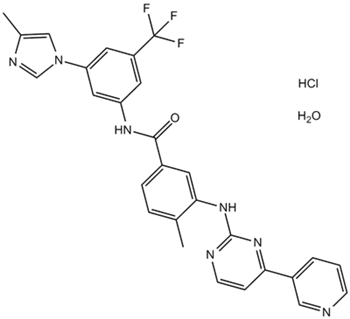Nilotinib monohydrochloride monohydrate |
| Catalog No.GC14237 |
A Bcr-Abl inhibitor
Products are for research use only. Not for human use. We do not sell to patients.

Cas No.: 923288-90-8
Sample solution is provided at 25 µL, 10mM.
Nilotinib monohydrochloride monohydrate is a second generation tyrosine kinase inhibitor (TKI), is significantly potent against BCR-ABL, and is active against many BCR-ABL mutants.
The novel, selective Abl inhibitor, Nilotinib (AMN107), is designed to interact with the ATP-binding site of BCR-ABL with a higher affinity than Imatinib. In addition to being significantly more potent compared with Imatinib (IC50<30 nM), Nilotinib also maintains activity against most of the BCR-ABL point mutants that confer Imatinib resistance[1]. Nilotinib demonstrates significant antitumor efficacy against GIST xenograft lines and Imatinib-resistant GIST cell lines. The parent cell lines GK1C and GK3C show Imatinib sensitivity with IC50 of 4.59±0.97 µM and 11.15±1.48 µM, respectively. The Imatinib-resistant cell lines GK1C-IR and GK3C-IR show Imatinib resistance with IC50 values of 11.74±0.17 µM (P<0.001) and 41.37±1.07 µM (P<0.001), respectively[2].
The percentage of tumor growth inhibition (TGI) is 83.8% for Imatinib and 69.6% for Nilotinib in the GK1X xenograft line (n.s.). In the GK2X xenograft line, TGI is 83.0% for Imatinib and 85.3% for Nilotinib (n.s.). Additionally, the GK3X xenograft line TGI is 31.1% for Imatinib and 47.5% for Nilotinib (n.s.). These results suggest that, except for the GK1X xenograft line, Nilotinib shows equivalent or higher antitumor effects than Imatinib[2]. Nilotinib has a significant healing effect on the macroscopic and microscopic pathologic scores and ensures considerable mucosal healing in the indomethacin-induced enterocolitis rat model. While Nilotinib decreased the PDGFR α and β levels and apoptotic scores in the colon, it did not have a significant effect on the weight and TNF-α levels. Further experimental investigations could provide more definitive evidence for humans[3].
References:
[1]. Weisberg E, et al. Beneficial effects of combining nilotinib and imatinib in preclinical models of BCR-ABL+ leukemias. Blood. 2007 Mar 1;109(5):2112-20.
[2]. Sako H, et al. Antitumor effect of the tyrosine kinase inhibitor Nilotinib on gastrointestinal stromal tumor (GIST) and Imatinib-resistant GIST cells. PLoS One. 2014 Sep 15;9(9):e107613.
[3]. Dervis Hakim G, et al. Mucosal healing effect of nilotinib in indomethacin-induced enterocolitis: A rat model. World J Gastroenterol. 2015 Nov 28;21(44):12576-85.
Average Rating: 5 (Based on Reviews and 30 reference(s) in Google Scholar.)
GLPBIO products are for RESEARCH USE ONLY. Please make sure your review or question is research based.
Required fields are marked with *




















